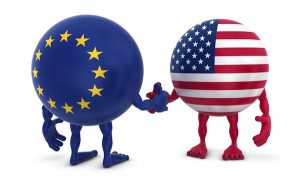(ThyBlackMan.com) One could easily become confused about the tenuous relationship between Europe, America and the rest of the known world. After all, America, though linked to Europe by blood and kinship, has staked its own claim to singular regard among the world’s community of nations. For a long time that claim was supported by economic, geographic and historical realities that set us apart from the world.
For the sake of relevance, we should first admit that America First is not the first attempt to clearly separate America’s destiny from that of the rest of the world. The first major such philosophy was known, of course, as ‘splendid isolation’ and was ultimately codified into the Monroe Doctrine. That world-view held that Europe stay out of American affairs, and restrict itself to European matters, leaving  America free to chart its own destiny. Conversely, America would refrain from involving itself in ‘old world’ politics, wars and economic decisions.
America free to chart its own destiny. Conversely, America would refrain from involving itself in ‘old world’ politics, wars and economic decisions.
Early in America’s history, Europe did not consider this a fair deal. European nations viewed with envy the westward expansion of the American Empire to California, and lustily eyed Mexico and South America as opportunities to stake their own claims to new world abundance. Several wars were fought against Europe, between 1776 and 1812, and we need no reminder here of the outcomes.
America ultimately secured her hard-won independence, and endured little interference from her European cousins, bound as they became within colonial entanglement and internecine strife. There did come a time, however, when cousins were called upon to aid their familial bonds. World War I was such a necessary occasion – and surely Americans viewed this as an engagement limited to rendering aid and supply. Nonetheless, Europe’s losses in men and capital were so costly that it affected the prosperity of entire generations and, if truth be told, laid the foundations for World War II.
Germany was not only Europe’s most advanced military power before the first war, it was also its most advanced democracy. Germany’s administrative state – efficient, just, and well-resourced – became a shining example of what a properly governed democracy could achieve in terms of human comfort and educational attainment. It provided a necessary counterpoint to America’s own democracy, which preceded an administrative state, and was messy and uncertain, but in the eyes of many promised a penultimate degree of individual freedom. Germany’s innovation of democracy presaged and fueled America’s mass production of it.
In the onerous aftermath of the war, dignitary harms and forced austerity ultimately turned the tide against European solidarity. It is worthy to note that similar indignities and economic pressures also drive our American hunger for a return to greatness. We have always enjoyed an absolute abundance within our national borders; but it is only now that we have come to rely upon a certain global prominence. Yet we are at a stage in history where we cannot have both simultaneously. Either we resign ourselves to our own ingenuity once again, or we resolve to answer the call of international emergency in the spirit of mutually assured prosperity.
That is the cusp upon which we now pause. Our President has issued a call for a return to our former splendor, and that requires inward focus. But we also have global commitments that will not diminish just because we ignore them. More fundamentally, our economy is subject to a real interdependency that tends to diminish our claims to absolute primacy.
So, what do we do? When we announce publicly that Europe must going forth pay its fair share to support our military alliance in NATO, and also compensate us for unpaid support – we set ourselves apart. Europe, for its part, has a valid claim for forbearance of its NATO obligations. Fossil Fuel energy costs are now at a generational bottom, and Europe could easily turn to suppliers like Russia to bolster its flailing economies. However, in the spirit of solidarity and its ongoing security relationships with NATO and the U.S., it has refused to allow Russia to build permanent delivery infrastructure throughout the continent.
On another front, China seeks to leverage its relationship with rogue nuclear state North Korea in order to force economic and military concessions from the U.S. A central tenet of the President’s America First strategy is to use American market power to demand fairer trade relations with China – which is easier said than done. If China senses that the America’s increasingly isolated foreign policy orientation reduces its ability to expend resources deflating North Korea’s recently aggressive military overtures, it may seek to exploit the perceived isolation. This is where an America first policy could potentially weaken America’s hand in orchestrating economic concessions from China and other trading partners.
Is NATO necessary or is it not? That all depends upon how much trouble one believes regional powers can wield in this scenario. Europe, especially England, has relied upon Russian resource capital to fuel its City of London financial capital. Can it survive in a world in which Russia restricts its investments in British banks? China supplies the lion’s share of consumer goods to America. If it’s ‘cat’s paw’ North Korea rattles its tail, is that cause for our nation to abandon its ‘America First’ policy merely to supplicate China? Perhaps so, but the short-term price in terms of consumer activity will be high. There are no easy answers to this, hence the conundrum.
Written by Armstrong Williams
Official website; http://www.armstrongwilliams.com

















Leave a Reply